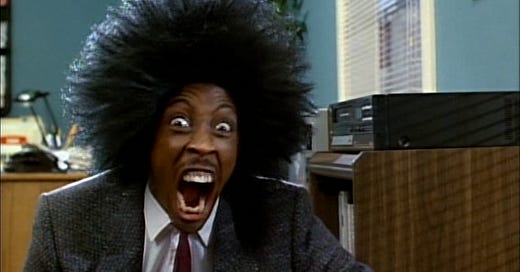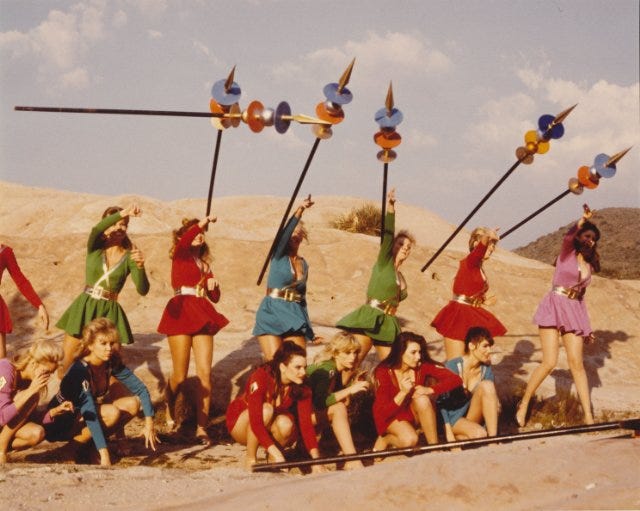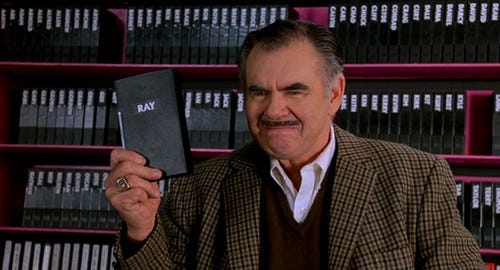Class of 1987: 'Amazon Women on the Moon'
In the “Class of …” series, we take a monthly look back at films celebrating either their 20th or 30th anniversary of initial release this year — six from 1997 and seven from 1987 (the extra in a forthcoming double-feature column). The rules: No Oscar nominees and no films that were among either year’s top-10 box-office grossers.
The American attention span is dwindling. So goes the drab, dispassionate spiel of academic drone Dr. Easterbrook early on in 1987’s “Amazon Women on the Moon” – a set of 19 loosely connected comic skits centered around TV channel flipping and strung across 80 minutes before the closing credits roll.
You can guess the punchline. An itchy trigger thumb immediately yoinks Easterbrook, jumping to a behind-the-scenes look at “Pethouse Plaything” Taryn Steele (Monique Gabrielle, a real-life Penthouse Pet), who asserts fame has not changed her. A one-joke bit, sure, but it nevertheless achieves bawdy sophistication – especially one shot when Gabrielle’s breasts precede the rest of her in the frame.
Although directed by five different sophomoric males — including John Landis (“The Blues Brothers”) and Joe Dante (“Gremlins”), reuniting after their other anthological endeavor, “Twilight Zone: The Movie” — “Moon’s” skits stem from the same writers.
Michael Barrie and Jim Mulholland wrote for “The Dean Martin Show,” “Welcome Back, Kotter” and “The Tonight Show Starring Johnny Carson” before moving on to uninspired Sylvester Stallone comedies, “Bad Boys” when it was slated to be a Dana Carvey-Jon Lovitz vehicle, and most recently, “Late Show with David Letterman.”
On one hand, “Amazon” feels today like an anomaly wrapped in an anomaly – a sketch-comedy film (of which there are few) rooted in randomized flipping, itself a rarity in an era of binge-watching and purposeful DVR planning. On the other, its sentiments still speak to modern media consumption.
With every electronic leap forward, the wick on our attention span shortens, blackens, takes longer to spark. That inherent tension is, of course, a source of “Amazon’s” often robust laughs that explore the ways technology strikes back – rebelling against basic tasks we expect them to provide, uncovering our moral transgressions and lurid titillations, robbing us of our best years before a screen.
Naturally, “Amazon” boasts a bunch of random frat-basement laughs, too. For if it’s not a formal sequel to “Kentucky Fried Movie” — 1977’s ne plus ultra of sketch-comedy films concocted by Landis and “Amazon” cohort Robert K. Weiss alongside Jim Abrahams and the Zucker brothers — it remains part of the Samuel L. Bronkowitz Extended Universe. (The fake producer’s name, a portmanteau of moviemakers Samuel Bronston, Joseph L. Mankiewicz and Samuel Z. Arkoff, pops up in both.)
Given its scattershot structure, the best way to tackle “Amazon” is more or less bit by bit from the top.
Starring “lots of actors,” the film opens with the first of Landis’s four segments – “Mondo Condo.” A character played by one-time Eddie Murphy protégé and talk-show host Arsenio Hall returns from a trip to find his home has turned against him. A cold beer ruins his suit. The food in his fridge has rotted. The garbage disposal tries to eat his tie. It’s just the beginning.
“Condo” stands apart from “Amazon’s” televisual conceit, but Barrie and Mulholland use it to establish their thesis: Modern convenience will turn on us all, so just wait. In mere minutes, it establishes Hall’s prodigious (and later cinematically unrealized) gifts for physical comedy – less for the adeptly deployed pratfalls, more for a body language of resignation and rage and a tone with which he shouts at no one in particular and a man continuously calling on the phone for a woman who doesn’t live there. Landis’s trademark contrast of clean-lined compositions and chaotic content is at peak power here as well.
After the “Pethouse Video” segment – one of three segments from Carl Gottlieb, who co-wrote the dichotomous hits “Jaws” and “The Jerk” – “Murray in Videoland” introduces us to the undershirt-and-boxers-clad old man (Lou Jacobi) working the clicker. He’s sucked into the TV (an idea later explored at feature length by Peter Hyams’ “Stay Tuned”), with only his wife, Selma (Erica Yohn), to help him.
Weiss boasts the most “Amazon” segments of any director with six, and they remain his only feature directorial credits to date. Weiss has gained greater fame as a producer / executive producer across multiple decades of comedy – from “Kentucky Fried Movie” and “The Blues Brothers” to the “Naked Gun” series and “Tommy Boy” and, finally, the back end of the “Scary Movie” franchise.
Unsurprisingly, Murray remains stuck in the set – becoming one of a few recurring characters throughout the film as the TV, presumably now under Selma’s thumb, flips to Landis’s “Hospital.”
Then married in real life, Peter Horton (TV’s “thirtysomething”) and Michelle Pfeiffer play new parents assailed by a doltish doctor (Griffin Dunne), who feels like a prototype for Chris Parnell’s Leo Spaceman (that’s Spa-chem-an) on “30 Rock.” It’s a pleasure to see Dunne go goofy after the existentially harried lead of “After Hours,” and the idea of hipster helicopter healthcare assumptions remains today. But Pfeiffer is just along for the ride with Horton (who also directs one of “Amazon’s” weaker segments).
Now, the titular fake film (directed by Weiss) gets its first turn. Part of a “Movies Til Sunrise” broadcast, the plot of this piece of purposefully Z-grade ’50s schlock concerns a 1980 space mission wherein three astronauts – and a tiny primate – will become the first men to walk on the moon. (Throwaway jokes abound in a bit that serves as cheesy connective tissue to the other skits and little more.) Of course, the astronauts encounter a race of buxom women, many less than friendly.
Promising no commercial interruption is the TV announcer’s grave error, as Murphy’s Law hijacks the broadcast. (The slight quibble: All the effects after which the station dumps out of the movie to an emergency backup play like a film print gone bad, not a botched broadcast.) As Selma flips around, she occasionally returns to the film, which picks up acts later with large chunks missing.
These technical issues introduce a series of six “Saturday Night Live”-esque product parodies: “Hairlooming” (a Dante-directed Hair Club for Men spoof); Gottlieb’s “Art Sale,” in which “everything must van Gogh” at an art museum going out of business; and Weiss’s “Silly Paté” and “First Lady of the Evening” – the former stopping at a pun and the latter sending up Sidney Sheldon’s page-turners.
Of these first four, only “Art Sale” works – nailing how we take the display of cultural artifacts for granted … and riffing on the opportunity to sign the Declaration of Independence yourself for a price, which veers further away from an outlandish joke with each passing day.
The best commercial belongs to Landis’s “Blacks without Soul” (and its offshoot album spots) – provocatively pitched between parody and politics. Here, B.B. King solicits funds for a charity to bring swagger back to black Republicans (including one played by Roxie Roker), station wagon-driving pimps and African-American teens who have started fan clubs “Good Morning America” host David Hartman.
Their poster child, though, is Don “No Soul” Simmons (David Alan Grier), a black Pat Boone who has “turned his personal affliction into a recording career.” With a creeper’s smile, hopelessly off-beat tapping toes, overactive eyebrows and impeccable diction on even a “funky” song like Three Dog Night’s “Joy to the World,” Grier creates “Amazon’s” most memorable character – still good for a guffaw 30 years on as “a master showman of non-threatening music.”
Horton’s sole effort, “Two I.D.s,” follows, with Steve Guttenberg and Rosanna Arquette as people prepping for a first date by perusing background checks. (His skeletons? Feigned interest in sushi and Meryl Streep movies, which is his plan for their evening, and rolling over to sleep after more than half of his 21 “average-rated’ sexual encounters.)
As retroactively prescient commentary on crowd-sourced connections and predictive dating technology, “Two I.D.s” gains a spark it lacked in an era of AIDS panic during which it perhaps played less appropriately. But Horton’s bland style suggests he wasn’t up to the sort of yuks demanded here.
From there, though, “Amazon” is almost flawless and often under the hand of Dante – a director for whom comedy has always burbled beneath a surface of kitschy suburban nightmares but who has rarely indulged it so openly and so goofily. His segments certainly mix curiosity for apocrypha and arcana with his morbidly amusing treatises on death. (Dante’s only so-so bit? “Reckless Youth,” a parody of reactionary black-and-white social disease PSAs with Paul Bartel and Carrie Fisher.) In the last half-hour, Dante gets four of his total five and three of them consecutively.
“Bullshit or Not” perfectly parodies “Unsolved Mysteries,” with Henry Silva filling in for Robert Stack. (A veteran of “Airplane!,” I’m sure Stack took no issue with sending up the show himself; I’m guessing the suits at NBC probably felt otherwise.) The series indulges “bullshit reenactments” that theorize, among other insanities, that Jack the Ripper was not human, and its catchphrase punctuates an announcer’s insistence that “Amazon Women on the Moon” will continue without further interruption.
“Critics’ Corner” and “Roast Your Loved One” are interconnected skits at the intersection of TV and real life – less in a Cronenberg-body horror sense than a sociologically satirical one. The former finds Harvey Pitnik (regular Dante bit player Archie Hahn) quarreling with reviews on a “Siskel & Ebert”-type show. (Barrie and Mulholland’s parodic name game is on point with the Swedish drama “Winter of My Despondency,” which critics hail for “haunting abstract symbolism” but which Harvey calls “arty crap.”)
But the critics turn to a new segment called Real Life Reviews … and assess Harvey’s eminently disappointing life as wife Bernice (Belinda Balaski) sits beside him. It’s a serrated edge of somberness portending social media’s endless echo chamber of complaining and picking people apart in real time.
“Roast Your Loved One” picks up down the line as a cabal of one-liner comedians – Rip Taylor, Slappy White, Jackie Vernon, Henny Youngman, Charlie Callas and Steve Allen, all playing themselves – have a humorous go at Harvey. While Bernice first looks on in bemusement, she then joins in. It’s a bit of a long way around to the idea that we must laugh about shortcomings to best appreciate someone’s strong suits, but it’s still clever. (After all, exorcisms of bad marital juju should be uncomfortable.)
Weiss’s “Video Pirates” is, again, another one-and-done joke … but worth it for the pirates’ response to the FBI warning on the film they fire up – “Son of the Invisible Man,” directed by Gottlieb and carried solely by Ed Begley Jr.’s lunacy as a scientist whom the nearby townspeople indulge in a genial way. Weiss’s “Titan Man” boasts an amusing premise, in which a horn-dog teen visits his kindly old druggist (Ralph Bellamy) to buy condoms – a plan that fantastically, and exponentially, backfires.
Landis’s “Video Date” finds ’80s That Guy stalwart Mark McClure renting a first-person POV movie that morphs from a first-person POV porn encounter into a full-blown nightmare co-starring Andrew Dice Clay. It’s shrewdly cast – such a thing seems like what softcore scion Russ Meyer, who plays the video store clerk, would have created if he could – and a direct antecedent to a fine VR porn-gone-wrong gag in “Michael Bolton’s Big, Sexy Valentine’s Day Special,” a recent Netflix program.
That Bolton special is the brainchild of the Lonely Island and Comedy Bang Bang – among the many comedians, creatives and collectives influenced by “Amazon” and its perpetrators: Funny or Die, Tim and Eric, Parker and Stone, Seth MacFarlane, Eric Andre, Key & Peele, Dave Chappelle, Dan Harmon (whose “Interdimensional Cable” episodes of “Rick and Morty” are like a direct homage to “Amazon”).
There’s no way Barrie or Mulholland could have presaged either their industry influence or how both we – and our messages – now self-destruct in just 10 seconds or 140 characters. Still, the thematic thoroughfare of “Amazon Women on the Moon” remains well trafficked … just now in a time of bandwidth instead of broadcast.





